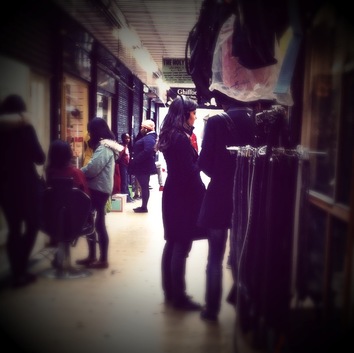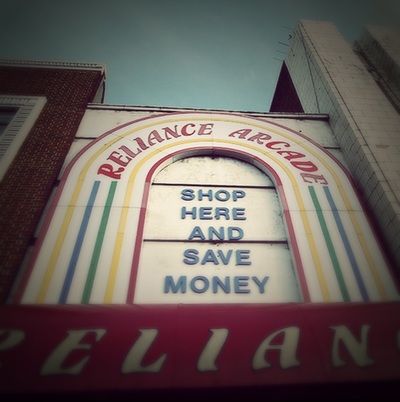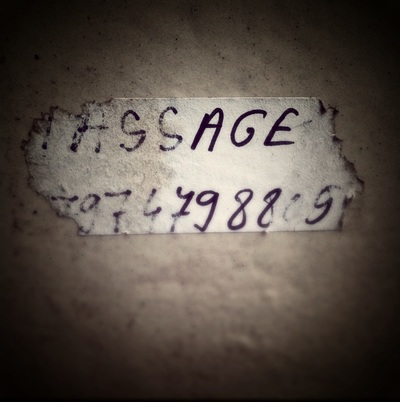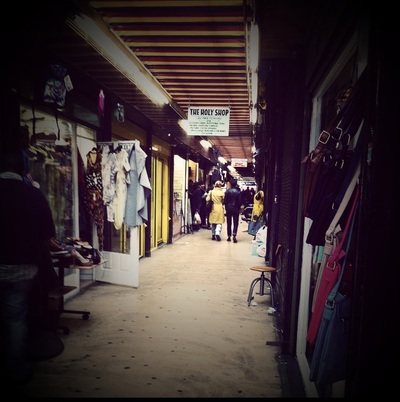
A typical Saturday on Brixton high street provides a buzz unlike anywhere else in the capital, with steel drums competing with the sounds of street preachers, the rumble of traffic and people calling out to each other. If you follow your nose to the smell of cinema-fresh popcorn you’ll find sounds altogether less commonly audible, thanks to Passage Tells, brainchild of Central St Martin’s student Daisuke Nakazawa.
Currently studying Narrative Environments (MA), Daisuke exposes the seldom heard sounds of Brixton’s Reliance Arcade, revealling the stories behind the market holders. A sound piece which takes place in the very landscape in which the sounds are born, Passage Tells offers the chance for participants to experience much more than the naked eye can see...
Currently studying Narrative Environments (MA), Daisuke exposes the seldom heard sounds of Brixton’s Reliance Arcade, revealling the stories behind the market holders. A sound piece which takes place in the very landscape in which the sounds are born, Passage Tells offers the chance for participants to experience much more than the naked eye can see...
As you walk up and down the passage, headphones in place, your ears are filled with the natural sounds of the market holders that you pass going about their daily work, or in some cases the silence of the empty units. Stopping still by any occupied shop unit offers you the chance to hear more about the closest vendor - how long they’ve been there, where they’re from, what brought them into this kind of work, what life in Brixton is like, and the trials and tribulations of being a Brixtonite.
The longer you walk, the more information becomes available to you. One shop holder explains how her relationship with her customers is much more than an anonymous customer-vendor relationship, her shop is ‘not just a clothes store’. Another admits that life is not easy: ‘to survive is to work hard’.
As you reach the street and begin to hear the public’s thoughts on Reliance Arcade, you become aware of it’s invisibility. Some people see the arcade everyday but don’t even know it’s name. One man ‘didn’t realise people went in there’.
It is undoubtedly a little shabby and run down, however a local community exists here; barbers, hairdressers, record stores, jewellers, shoe-makers, travel agents, you name it.
It may be that something has to be of a certain standard for people’s awareness to be activated, however it seems to me that there is more than this at work here. The arcade demonstrates the two worlds co-existing in Brixton; the people outside of the arcade and those within, the street and the arcade acting to some extent as microcosms of two very different realities.
The stories told speak of an eclectic yet disjointed Brixton, where there exists an ocean between those that visit the arcade and those that don’t. On the one hand the arcade is not anonymous, but almost forbidden - an air of intimidation surrounding the concept ‘this place is not for me’, on the other is almost a territorial sentiment which is born out of fear of change; the age old tale of London regeneration sucking the life out of areas and pricing out the locals. A number of vendors believe a change would be negative for black culture, believing that the upcoming hotel development on the floors above the arcade could either cause the landlord to sell the arcade for renovation or hike the rent. Change is synonymous here with loss of livelihood and powerlessness; already these people have seen larger chain stores come to the high street and take custom away.
The best thing about this sound piece isn’t the sense of adventure that comes with discovering the ‘CD’s’ sign marking the start of the work, nor is it that the sounds are entirely responsive, dependent on your movement and location. The feat of Passage Tells is the innovative and insightful way that it manages to tell the people’s story in a genuine, natural way.
Passage Tells: Brixton
Reliance Arcade, Brixton, SW9 8JZ
http://passagetellsproject.net/
Join the waiting list here
Tip: Treat yourself to a bag of popcorn
Update: I caught up with Daisuke to hear how his audience perceived the sound installation. The answers proved were varied as you'd expect: "Some people were impressed that the storyline illustrated the issue of gentrification from different perspectives through the two conflicting minds of welcoming it and fearful of change. Some were uncomfortable as they considered themselves as a part of gentrifiers. Some felt that change and impermanence were a part of our transient life and everyone would leave a place at some point in our lives."
So what 's next for Daisuke? His next stop will be Edinburgh Fringe Festival this summer to create Passage Tells: Edinburgh. The Edinburgh version will focus on local residents living in the centre of the touristic city; the audience will listen to the voices of local residents and learn how they feel about local tourism and the visitors themselves.
The longer you walk, the more information becomes available to you. One shop holder explains how her relationship with her customers is much more than an anonymous customer-vendor relationship, her shop is ‘not just a clothes store’. Another admits that life is not easy: ‘to survive is to work hard’.
As you reach the street and begin to hear the public’s thoughts on Reliance Arcade, you become aware of it’s invisibility. Some people see the arcade everyday but don’t even know it’s name. One man ‘didn’t realise people went in there’.
It is undoubtedly a little shabby and run down, however a local community exists here; barbers, hairdressers, record stores, jewellers, shoe-makers, travel agents, you name it.
It may be that something has to be of a certain standard for people’s awareness to be activated, however it seems to me that there is more than this at work here. The arcade demonstrates the two worlds co-existing in Brixton; the people outside of the arcade and those within, the street and the arcade acting to some extent as microcosms of two very different realities.
The stories told speak of an eclectic yet disjointed Brixton, where there exists an ocean between those that visit the arcade and those that don’t. On the one hand the arcade is not anonymous, but almost forbidden - an air of intimidation surrounding the concept ‘this place is not for me’, on the other is almost a territorial sentiment which is born out of fear of change; the age old tale of London regeneration sucking the life out of areas and pricing out the locals. A number of vendors believe a change would be negative for black culture, believing that the upcoming hotel development on the floors above the arcade could either cause the landlord to sell the arcade for renovation or hike the rent. Change is synonymous here with loss of livelihood and powerlessness; already these people have seen larger chain stores come to the high street and take custom away.
The best thing about this sound piece isn’t the sense of adventure that comes with discovering the ‘CD’s’ sign marking the start of the work, nor is it that the sounds are entirely responsive, dependent on your movement and location. The feat of Passage Tells is the innovative and insightful way that it manages to tell the people’s story in a genuine, natural way.
Passage Tells: Brixton
Reliance Arcade, Brixton, SW9 8JZ
http://passagetellsproject.net/
Join the waiting list here
Tip: Treat yourself to a bag of popcorn
Update: I caught up with Daisuke to hear how his audience perceived the sound installation. The answers proved were varied as you'd expect: "Some people were impressed that the storyline illustrated the issue of gentrification from different perspectives through the two conflicting minds of welcoming it and fearful of change. Some were uncomfortable as they considered themselves as a part of gentrifiers. Some felt that change and impermanence were a part of our transient life and everyone would leave a place at some point in our lives."
So what 's next for Daisuke? His next stop will be Edinburgh Fringe Festival this summer to create Passage Tells: Edinburgh. The Edinburgh version will focus on local residents living in the centre of the touristic city; the audience will listen to the voices of local residents and learn how they feel about local tourism and the visitors themselves.




 RSS Feed
RSS Feed
